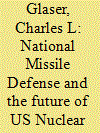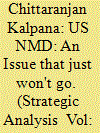| Srl | Item |
| 1 |
ID:
019054


|
|
|
|
|
| Publication |
May 5, 2001.
|
| Description |
17-19
|
|
|
|
|
|
|
|
|
|
|
|
|
|
|
|
| 2 |
ID:
019570


|
|
|
|
|
| Publication |
July-Aug 2001.
|
| Description |
97-109
|
|
|
|
|
|
|
|
|
|
|
|
|
|
|
|
| 3 |
ID:
017773


|
|
|
|
|
| Publication |
Oct 2000.
|
| Description |
39-41
|
|
|
|
|
|
|
|
|
|
|
|
|
|
|
|
| 4 |
ID:
019906


|
|
|
|
|
| Publication |
Summer 2001.
|
| Description |
40-92
|
| Summary/Abstract |
If U.S. national missile defense (NMD) were only about countering ballistic missiles deployed by rogue states, 1 then whether to deploy limited NMD would be a "normal" national security issue. The military-technical question would concern feasibility: Would the missile defense work against the small missile forces that a few states may eventually deploy? The military-political questions would concern the risks to the United States of being vulnerable to rogue-state missiles and the amount Washington should be willing to pay for insurance against these risks.
What makes NMD special is its unavoidable connection to U.S. strategic nuclear policy and to the United States' political relationships with Russia and China. Both states view U.S. NMD as a threat to their strategic nuclear capabilities and their relationship with the United States. If technically successful, even the limited NMD planned by the Clinton administration might in some scenarios undermine the capability of Russian nuclear forces. Russia will find limited NMD still more worrisome, anticipating that initial U.S. deployments would be followed by larger ones. The NMD system under development poses a larger and more immediate challenge to Chinese nuclear capabilities, which currently include only about 20 single-warhead intercontinental-range missiles. The Bush administration has called for more robust and ambitious NMD--possibly increasing the number of ground-based interceptors and adding sea- and space-based interceptors--which promises to make it still more threatening. 2 Moreover, some proponents favor deploying NMD not only against rogue states, but also against China and possibly Russia. For example, [End Page 40] Senator Jon Kyl (R-Arizona) reportedly said that "it's easy to talk about North Korea, Iran and Iraq, but . . . behind closed doors you hear some people expressing some concerns about ultimate threats like China."...
|
|
|
|
|
|
|
|
|
|
|
|
|
|
|
|
| 5 |
ID:
018267


|
|
|
|
|
| Publication |
Winter 2001.
|
| Description |
15-23
|
|
|
|
|
|
|
|
|
|
|
|
|
|
|
|
| 6 |
ID:
019583


|
|
|
|
|
| Publication |
June 2001.
|
| Description |
768-770
|
|
|
|
|
|
|
|
|
|
|
|
|
|
|
|
| 7 |
ID:
018774


|
|
|
|
|
| Publication |
Spring 2001.
|
| Description |
19-25
|
|
|
|
|
|
|
|
|
|
|
|
|
|
|
|
| 8 |
ID:
018223


|
|
|
|
|
| Publication |
Jan 2001.
|
| Description |
1927-1938
|
|
|
|
|
|
|
|
|
|
|
|
|
|
|
|